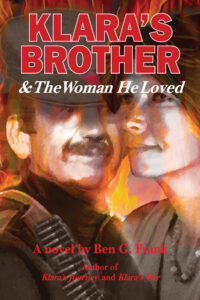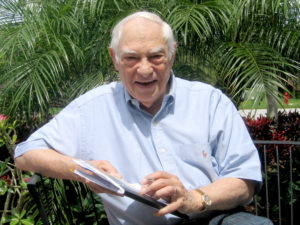
By Ben G. Frank
Many love affairs begin with a first glance.
Before the jet age, many romances began on a train or in a railroad station.
Who does not recall the great Russian novel, Anna Karenina, or the classic film, Waterloo Bridge.
Rail stations were always a part of my family’s story.
One hundred years ago, my mother, Sonya, of blessed memory, left Odessa, Ukraine, by train to Romania with her mother and sisters. They were refugees. They wanted no part of the Russian Bolshevik Red Army, just as today’s Ukrainian refugees don’t want to live under a conquering Russian army.
As a child growing up, I often heard the story of their escape, especially when the grownups got together. In whispers, my mother and her sisters talked about their brother, Mischa, who had disappeared. They believe he ran away to the army. He was never heard of again.
I dug deeper into the family story and after years of talking to relatives, I began to tell their story in what became my Klara Trilogy.
Klara’s Journey was the first of three historical fiction books, each independent of each other. This first novel is a gripping saga of Russia’s civil war–much of which takes place in today’s Ukraine, and involves the journey of the oldest sister, Klara who, leaves the family, and traves across Siberia to get to the U.S. to find her father.
Klara’s War, the second of the trilogy, finds Klara’s niece fleeing Ukraine when the Nazis invade Russia. Her story ends during the turbulent post-war era of Israel’s Independence in 1948.
And then I wrote the just-released, Klara’s Brother & The Woman He Loved, the last of the Klara Trilogy. But I never believed that my new work of historical fiction, including much material about Ukraine which has been invaded by Russia, would be so timely.
Indeed as I write this article, I watch on television Ukrainians fleeing their homeland. The newscaster reports that Odessa, this beautiful Black Sea port.
In order to write this family story, I had to go to Odessa. I walked the city streets and admiring its buildings, designed in neo-classical architectural style, including the attractive, yellow-and-white, local mansions, many of which display a Mediterranean theme.
I visited Proharovskaya street where my family lived. I wonder if the building will still stand if the Russians reach it in this 2022 invasion.
I move along Primorsky Blvd. to Nikolaevsky Blvd. to inhale the “spicy aroma of the acacias” hanging over the city’s busy harbor and the famous 240 Odessa Steps
At the top of the steps stands the statue of the Duc de Richelieu clad in a Roman toga; he is known as Armand Emmanuel du Plessis, 5th Duke of Richelieu, a French émigré, who served as governor of Odessa from 1803 to 1814. Now the “stone duke” points at all those arriving to his beloved city, Putin’s Russians, excluded.
And here’s where railway stations come in, especially in Klara’s Brother & the Woman He Loved.” I head to the Odessa-Holovna railway station. It was built in the second half of the 19th century, damaged in 1944, and rebuilt in 1952. I decide to begin the novel’s love story here. The year is 1919. The Czar has been dethroned. The democratic government which succeeded it, has been deposed by the Revolutionary Russian Bolsheviks, commonly known as Reds. Opposing them are the Whites, former Czarist army officers and Cossacks, Mischa, a Bolshevik starts out as member of the Communist Red Guard, becomes a Chekist secret police and is promoted to Commissar.
In the rail station, Mischa , trying to board a train is pushed to the ground by an unruly crowd trying to escape the city. He can’t get up. So, he sits up and raises his hands, hoping someone will take hold of them and lift him up. In seconds, his arms are grabbed and his body pulled upward by the strong, but soft hands of a young beautiful woman facing him. Both are pleased at what they see in each other.
Thus begins this tumultuous story. From the moment Commissar Mischa Rasputnis embraces Basya Abramskaya, a Soviet spy, the couples’ fate is pitted against the Kremlin’s secret police who warn the couple never to communicate with each other again. Wrenched from the arms of his loved one, Mischa often dreams he sees Basya in the sunflower fields of Ukraine. Will their love endure years of separation?
Finishing this article, I turn on the news. “It’s calm in Odessa now. But we’re waiting for the worst,” a Ukrainian official tells the BBC. Sounds like Mischa who in Klara’s Brother & The Woman He Loved, asked: “What’s end game.”
Ben G. Frank, a former resident of Chappaqua, is a journalist, lecturer and author of books on Russia and Ukraine, including the just published historical novel, Klara’s Brother & The Woman He Loved. He now resides in Palm Beach County, FL. Ben Frank’s books are available wherever books are sold.

 I also made sure that my travel book would be a practical, anecdotal, and adventurous journey through Jewish Europe, including in the text: kosher restaurants, cafes, synagogues, and museums, plus cultural and heritage sites.
I also made sure that my travel book would be a practical, anecdotal, and adventurous journey through Jewish Europe, including in the text: kosher restaurants, cafes, synagogues, and museums, plus cultural and heritage sites.